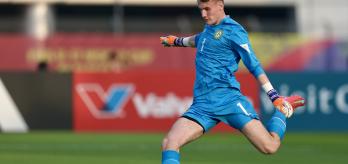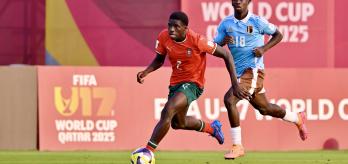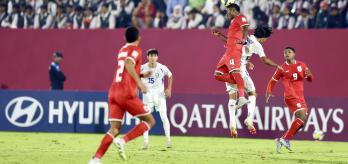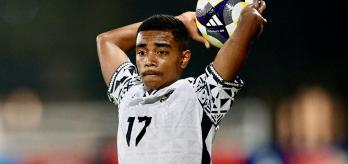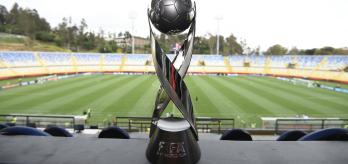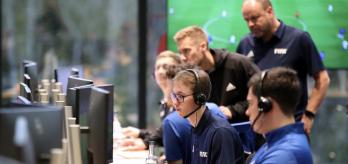Hermann Stadler’s side have won all seven of their matches in normal time, with their distinctive team ethic standing out for our Technical Study Group (TSG).
En route to the FIFA U-17 World Cup 2025™ final against Portugal in the Khalifa International Stadium on Thursday, November 27th, Austria have earned victories against Saudi Arabia, Mali, New Zealand, Tunisia, England, Japan and Italy, with forward (19) Johannes Moser scoring eight goals in the six games he has started.
Key characteristics
According to FIFA TSG expert Ives Serneels, the key strength of Austria’s team is the team itself.
-
Collective, cohesive and intuitive team in and out of possession
-
Defend aggressively in compact blocks with short lines between their units
-
Do not take risks in low or mid build-up
-
Dynamic forward players who can turn difficult balls into something special
-
Strong and fast in transition to attack
-
Efficient in attack, not needing many chances to score
-
Highly resilient team with outstanding work ethic
“They are a team that plays to the strengths of their individual qualities, and they have chosen the way they play based on the strengths of the players. Credit must go to the head coach and coaching staff for how the team works together and has great synergy. They won every game [without penalties] and only conceded one goal, and that does not happen by chance. There is a very strong connection between all the players, and you see this in every match they play.
“Their defenders love defending, are strong in duels and work very hard for each other, while their centre-midfielders provide excellent defensive protection, with Vasilije Markovic (10) acting as the engine in the team. There is amazing synergy between their forward players and advanced midfielders, all knowing what runs to make and when to make them, with left winger Moser (19) showing he can score different types of goals, registering eight so far, including four penalties and a direct free kick.”
Serneels uses the clip below to show how committed Austria’s players are to understanding and fulfilling their roles as they set up to press Italy’s goal kick high. When the midfielder that Markovic (10) is responsible for marking advances to take the goal kick, he follows him all the way, telling his team-mates to pick up their own players, before initiating an aggressive double press.
In possession
As TSG expert Aron Winter notes, “Austria are an efficient in-possession team that don’t take risks in the build-up. Even as they progress the ball in a 4-3-3 or 4-4-2, they push up, keeping their lines short all the time, especially in the middle of the pitch. This means they deny opponents space to play through if they lose the ball, but it also helps them get quick counter-pressure applied. They often play long passes forward to centre-forward Nicolas Jozepovic (7) and/or attacking midfielder Jakob Werner (8) for flick-ons to their wide forwards, who are always supporting and anticipating.
“They are very dangerous in transition from long balls because they are fast and know exactly what they are trying to do. Their forward players are strong in 1v1 situations, can hold the ball, are strong in duels, and have the technical quality to keep the ball and move it quickly. Often, teams in possession stretch the pitch and make it big, but Austria don’t do that. They are very composed and compact vertically, so they can win the ball back and get pressure on quickly.
“More than half of their starting team in the semi-final versus Italy play for the same club (FC Liefering – the reserve team of FC Salzburg), and you can see the players have natural synergy and intuitive movements. They have the technical quality to get out of tight spaces and dynamic players. They are efficient in attack and don’t need many chances to score. Interestingly, only one of Austria’s 16 goals so far has been scored in the first half.”
Winter has chosen clip 2 below to show how efficient and explosive Austria are when transitioning from a defensive block. The defensive lines are short, enabling intense pressure, and as soon as the ball is turned over, the three advanced midfielders move to initiate the counter-attack, as centre-forward Jozepovic (7) isolates a resting defender in a 1v1.
Out of possession
According to Hérita Ilunga, “Austria are a very mean team defensively, conceding just one goal in their seven games leading up to the final. They are a team that can control the game when they don’t have the ball because their mid/low defensive blocks are so well-drilled and disciplined. They squeeze the pitch and put density in their compact shape. They are very aggressive and collective once their pressing trigger is activated, and they are very quick on transitions.
“The work ethic of this team when they don’t have the ball is unbelievable, and their players are very seldom isolated in 1v1s, as the player in active defensive engagement always has cover. They know they will suffer against teams that dominate the ball and have such good body language, and are prepared to work for everything they get in a game.”
Ilunga uses clip 3 below to highlight the collective nature of Austria’s approach to defending.
Goalkeeper: Daniel Posch
The TSG’s Goalkeeping Expert, Pascal Zuberbühler, is full of praise for Austria’s shot-stopper, Daniel Posch.
“What's incredible is that Posch has played in six of Austria’s matches and has not yet conceded a goal. This is a testament to their whole defensive system and the relationships and understanding between the defenders and their goalkeeper. He has been very decisive when defending his goal, showing speed and explosivity to cover ground, and when attackers are close, he is powerful and has great posture.
“In games where he has not had many actions to make, his concentration levels have been high, and he has been solid in the moments where he was needed. His positioning is good when dealing with through passes, and he has faced a lot of crosses. In possession, he does not take many risks, but defensively, he does the most important thing, and that is preventing goals from being scored.”








